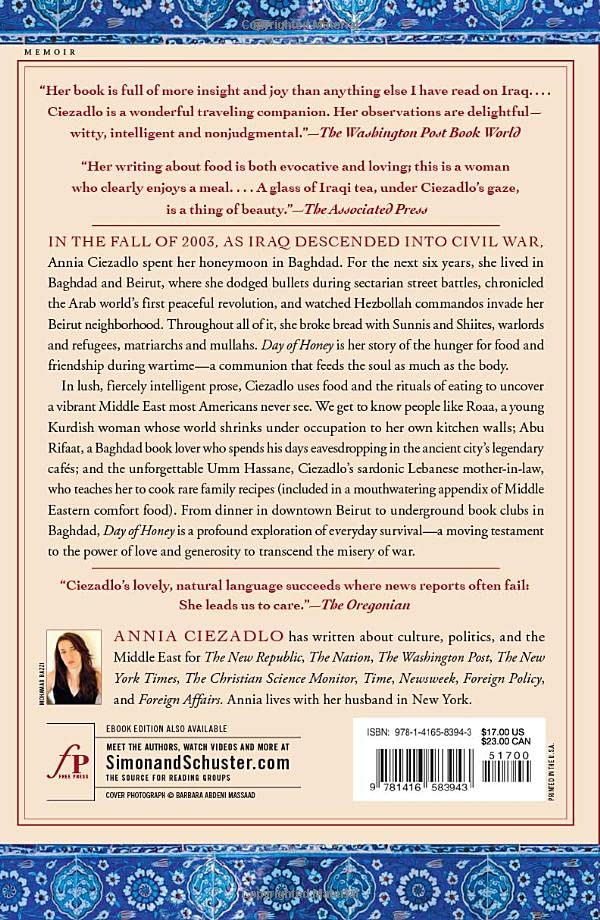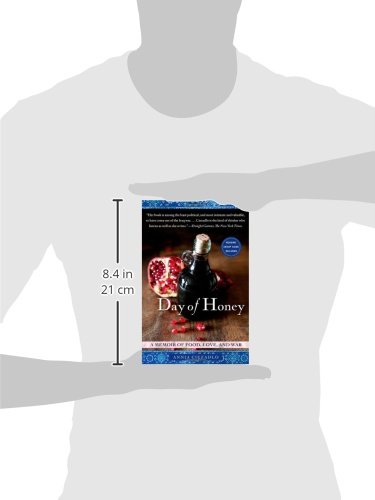



Day of Honey: A Memoir of Food, Love, and War
T**N
Wordy, but do not give up on it.
To start, I read this book alongside Anna Badkhen's Middle East cookbook/memoir "Peace Meals: Candy-Wrapped Kalashnikovs and Other War Stories," a remarkably different book in terms of tone and writing style while still focusing on similar themes. As a result, this review serves more as a compare/contrast between the two books than a standalone look; however, I think the books are both similar and different enough to warrant this, and it should give you the information to discern which of the books will better suit your tastes.On its own, Annia Ciezadlo's memoir would not stand out among the thousands of other memoirs to be found about the Middle East. What makes hers unique, however, is her focus on food and her inclusion of recipes to provide a second experience for the reader. This makes her more relatable and her story overall more personable. Ciezadlo recalls her experiences in Lebanon and Iraq alongside her husband Mohamad, and food, arguably, is the thing that keeps her sane throughout the strife-filled state of affairs, particularly in Lebanon.Unlike in Badkhen’s memoir, Ciezadlo’s thoughts and experiences are integral to the story. She may be a freelance reporter, but this story shows no signs of the objectiveness of wartime reporters and instead reads like a memoir should – personable and enjoyable. The grittiness found in Badkhen’s story is replaced with more flowery prose and more memorable characters like Dr. Salama, Roaa, and Umm Hassane. Each character is fleshed out with loads of personality that impact the story and make you sympathize with Ciezadlo’s situation. They honestly feel like family, and when characters are put in danger you begin to fret and wonder how it will turn out.The flip side, of course, is that locales and environments are left to the imagination of the reader and there is very little tension compared to Badkhen’s life-or-death situations. Ciezadlo only briefly describes the escalating sectarian violence occurring in Iraq, and even then it is not seen as an impending threat that plunges the country into civil war and leaves people cowering in their houses. Even the way she describes Baghdad is bizarre: She considers it a “honeymoon” rather than the war zone that it should be. Pressing concerns are not about where she can walk without being a target, but instead about where she can find “true” Iraqi cuisine. Needless to say, Ciezadlo’s accounts feel out of place with the Iraq Americans are familiar with today, and to say that she wears rose-tinted glasses would be an understatement.The main criticism with this book is that it feels too long considering how little is actually accomplished. The section on Iraq, in particular, seems to drag on without any stakes being raised or dilemmas being resolved. What made Badkhen’s experiences so memorable is that she wastes no time establishing settings and dives into the meat of whatever problem she must contend with that day. Everything clicks along at a crisp pace without sacrificing the imagery or drama of the story. In contrast, however, Ciezadlo feels slow and lifeless at times, and that may be enough for some to put down the book halfway through without finishing it. This is a shame, however, considering that she does a wonderful job in delineating her characters and actually providing some humorous and often touching anecdotes throughout the book. However, the most telling part of the story is that you could essentially eliminate the Iraq section and little to nothing of importance would be lost.Thankfully, however, her experiences with the Cedar Revolution in Lebanon, presumably because they hit closer to home, are more gripping and exciting for the reader. Once again, you sympathize with the trials and tribulations of the characters as they try to carry on a normal lifestyle while war breaks out in the streets, all while the tension ratchets up and the writing tightens up. This is what constitutes the bulk of the book, and it is also where it is most enjoyable to read. Her interactions with her mother-in-law are all too relatable even for Western audiences, and her commentary on Lebanese society is biting and well-written. Like Badkhen, she prefers to remain neutral as chaos reigns all around her, but unlike Badkhen she is attached to her setting because it is her adopted home; even though she could leave, she chooses not to.Food becomes more important than ever as stores close ahead of the Israeli bombing campaign and subsequent political violence, and this is how she connects to the reader. Food, like with Badkhen, provides an essential social link that can provide comfort in times of turmoil, and here that social link is made stronger by Ciezadlo’s connection to the story. When her father-in-law passes away, she goes into detail about the food that was served at the wake and connects it to social commentary about the peculiarities of Lebanese society as well as to the emotions of her family. Cooking with her mother-in-law is a humorous vignette that contrasts with the turmoil outside their apartment window and provides a sense of normalcy. The fact that Mohamad does not try Ciezadlo’s cooking and the ensuing marital troubles they must endure emphasize the political troubles of the country as a whole. Food is the ultimate connection in this book, and without it the story would not have the same resonance that it does.On the whole, “Day of Honey” is wonderful memoir that knows how to play to its strengths but ultimately feels so long-winded that it might drive some readers away despite how well the latter half of the book is written. The section on Iraq feels tedious and uneventful, but the rest of the book is gripping, relatable, and rather enjoyable. In comparison to “Peace Meals,” the latter is a better overall book but “Day of Honey” has more memorable characters and readers can invest more into the author. If you have a large chunk of time and enjoy reading about foreign cultures and cuisines, this book will give you that and a compelling narrator to guide you along.
S**D
Thoroughly delightful!
Annia Ciezadlo's Day of Honey is an absolute delight to read. This young woman is willing to try anything as long as it's food and especially if it's new to her. Annia, American with a Greek grandmother, eventually marries a man from Beirut, Lebanon and travels to Beirut and Baghdad with him. They are both journalists and are willing to take some risks in a war-torn country to get the stories back to their respective publications. Annia admits in the very beginning that she loves food and is always hungry, and she believes that the best way to learn about a people,their culture and their country is by sampling and preparing the foods they eat. She explains the history of many of the foods, and how some of them have played a part in history. Some that we eat have been prepared the same way for thousands of years. Annia feasts her way through Baghdad and Beirut as she goes back and forth. Stuffed grape leaves, fatoush, falafel, cucumber salad, batata wa bayd mfarakeh (chicken soup) and so many others that she ate in restaurants and friends' homes became comforts to her, and she also learned to cook them while cooped up in a very small hotel room with a double-burner hotplate as her only means of cooking. While war was going on outside, she put water, foods and goods in the small hall where she and her husband could eat relatively safely, using the double burners. As Ceizadlo deftly points out, there may be a war raging, but people still have to eat.I learned so much about the Middle East in general and about foods, specifically. There is much humor along the way, especially where her husband's family is concerned. The author is respectful, resilient, resoureful, doesn't offer a lot of political opinion, and is a wonderful and faithful friend. By the time I finished the book, I wanted to go to the markets in Beirut to buy the fresh breads for the day and the foods to prepare the day's meals.While reading this book, it was by pure circumstance that I had the occasion to visit a Middle Eastern restaurant that a family member frequents while I was on a short trip. When handed the menu, there were the foods that Annia talked so much about. I was able to sample fatoush, falafel, stuffed grape leaves and homemade baklava. Kebab, cous cous and some others as well. It was beyond exciting. It's well worth the purchase to own a copy for the recipes and now I've ordered a Middle Eastern cookbook. Believe me, it's all as delicious as it sounds. I couldn't have picked a better book to read at a better time. Even if you don't like to cook, Day of Honey is worth reading.
I**D
The Day of Honey and good food
The `Day of Honey' is neither a cookbook nor a travel book: it is a free of stereotypes journey through the cultures of the Middle East, from Lebanon to Iraq and back to New York city. In a very tensed world, facing wars and violence, food is the only recipe for peace and dialogue. It is a book that should be included in the list of the compulsory bibliography of any diplomat ready to enter the real world of wars and peace between the nations. Being able to eat is part of the basic survival, but sharing the food is the art of the conversation between the cultures. The dialogue around the table goes far beyond the global level and focus on the very person and human communication: if you love your children you give them food good food. If you want a future for them, you plant the seeds of the new harvest and do your best for avoiding as much as possible the possibility of avoiding the causes of destruction of your harvest. It could be life threatening effort to try changing a society manipulated by war thugs and fanatic leaders, but at least you can hope that when the war is over you do not forget how to broke bread around the dinner table. This could be more available for Lebanon whose South was and is extensively used as a war area by the terrorist Hizbullah who does not put any price on the life of their own people.Besides the good writing, the Day of Honey is a wise lesson in public diplomacy, but also a lesson of good taste and good food. Honestly, from the beginning to the end of the book, I was all the time hungry and ready to taste a fresh pita and some good hummus. I finished the book just in time for getting ready to prepare one of the recipes included at the end of the volume.
S**R
Great read and gives great insight to the middle east history and its food
currently reading this book and getting real insight to the politics and food of the middle east.very insightful, honest and funny. learnt a lot
B**O
Simply great.
Fantastic read, moving stories and great collection of recipes!
J**A
Enjoyable read for those in love with food and Middle East
Like "The Language of the Baklava", a compelling story told around Middle Eastern recipes (with the Iraq and Lebanon-Israeli wars in the background).
Trustpilot
3 weeks ago
1 day ago